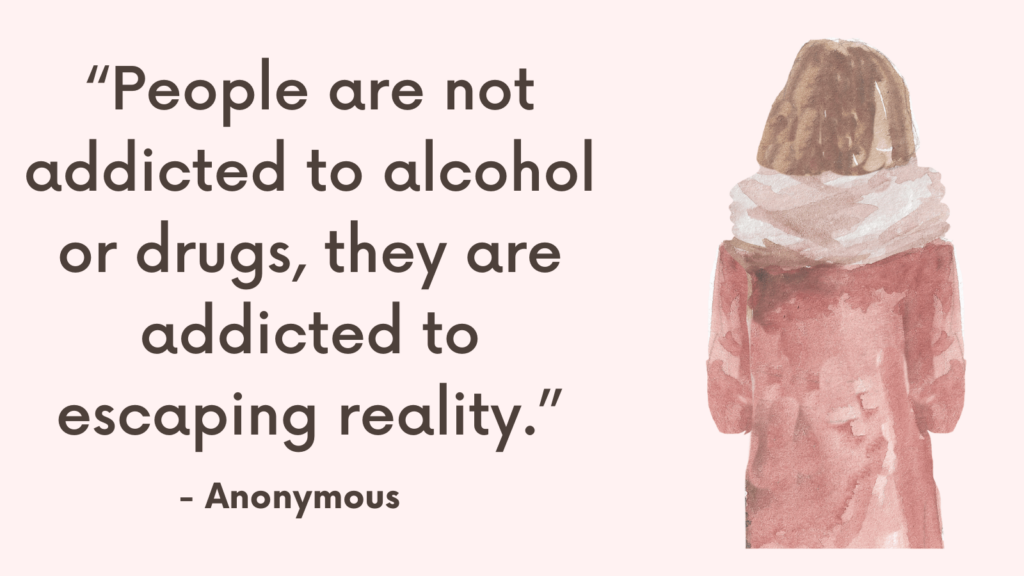In this post, you’re going to learn all about setting boundaries with an alcoholic.
The Challenges of Setting Boundaries With An Alcoholic
1. Emotional Complexity
Setting boundaries with an alcoholic loved one can evoke a range of intense emotions, including guilt, fear, anger, and sadness.
These emotions can make it challenging to assert and maintain boundaries effectively.
2. Desire to Help and Protect
Many individuals find it difficult to set firm boundaries with someone struggling with alcoholism due to a genuine desire to help and protect them.
This inclination may lead to enabling behaviors that hinder the establishment of healthy boundaries.
3. Familial and Social Pressures
Family dynamics and social expectations can complicate the process of setting boundaries.
Concerns about how others perceive the situation, as well as family history and dynamics, can add layers of complexity to the boundary-setting process.
4. Manipulative Behavior
Individuals struggling with alcoholism may exhibit manipulative behaviors to bypass or challenge established boundaries.
This can create a cycle of emotional manipulation and resistance to the enforcement of boundaries.
5. Fear of Confrontation
Confronting an individual about their alcoholism and establishing boundaries can evoke significant fear of conflict, rejection, or further strain on the relationship.
This fear may deter individuals from setting necessary boundaries.
6. Relapse and Setbacks
The unpredictable nature of addiction can lead to relapses and setbacks, which can test the resilience of established boundaries.
Individuals may struggle with feelings of disappointment and uncertainty when faced with these challenges.
7. Co-Dependency and Enabling
Co-dependent relationships and enabling behaviors can undermine the establishment of clear boundaries.
Over time, these patterns can erode individual autonomy and self-care, making it even more challenging to set and maintain boundaries.
8. Unpredictable Behavior
Alcoholism can lead to erratic and unpredictable behavior in individuals, creating uncertainty and instability in relationships.
This unpredictability can make it difficult to establish consistent and effective boundaries.
Related: Top 25 Tips On How To Set Boundaries Without Being Controlling? (+FREE Worksheets PDF)
24 Tips On Setting Boundaries With An Alcoholic
1. Self-Reflection and Assessment
Before establishing boundaries, take time to reflect on your own emotions, needs, and triggers.
Consider how the individual’s alcoholism has impacted your well-being and relationships.
This self-reflection will help you recognize the importance of setting boundaries for your own health and emotional stability.
2. Educate Yourself About Alcoholism
Understanding the nature of alcoholism is essential for approaching the situation with empathy and knowledge.
Educate yourself about alcohol use disorder, its effects on individuals and their relationships, and potential underlying factors contributing to the individual’s behavior.
3. Clarify Your Boundaries
Clearly define your boundaries and communicate them directly and firmly. It’s important to be specific about what behaviors are unacceptable and the consequences for violating these boundaries.
For example, you may decide that you will not tolerate being around the individual when they are intoxicated or that you will not provide financial support for alcohol-related expenses.
Related: 7 Types of Boundaries (+FREE Worksheets)
4. Use “I” Statements
When communicating your boundaries, use “I” statements to express your feelings and needs.
For example, “I feel uncomfortable when you drink excessively around me, and I need to prioritize my own well-being by setting this boundary.”
5. Consistency is Key
Enforce your boundaries consistently.
This can be emotionally challenging, but it sends a clear message about your limits and expectations.
Consistency helps to establish the credibility of your boundaries and demonstrates your commitment to prioritizing your well-being.
6. Seek Support from Others
Reach out to friends, family members, or a therapist for emotional support and guidance as you navigate this challenging situation.
Support groups such as Al-Anon, which provide support to family members and friends of individuals struggling with alcoholism, can offer valuable insight and a sense of community.
Related: Boundaries vs Ultimatum
7. Prioritize Self-Care
Engage in self-care activities to manage the emotional toll of setting boundaries.
This may include activities you enjoy, exercise, mindfulness practices, or seeking professional counseling to process your feelings and experiences.
8. Set and Enforce Consequences
Communicate and uphold consequences if the established boundaries are not respected.
Consequences should be clear and enforceable, aiming to protect your well-being.
For instance, if the individual violates a boundary related to drinking in your presence, you may choose to leave the situation or end the interaction.
9. Encourage Professional Help
Encourage the person struggling with alcoholism to seek professional support.
Offer to assist in finding resources such as counseling, support groups, or treatment programs.
Express your willingness to support their journey towards recovery.
Related: What Do Boundaries Sound Like? + 35 Boundaries Examples
10. Understand Safety Concerns
If the individual’s behavior poses a risk to your safety or well-being, it is essential to prioritize your own safety.
Do not hesitate to seek help from appropriate authorities or organizations if you feel unsafe or threatened.
11. Approach with Empathy
While setting and maintaining boundaries, approach the individual with empathy and understanding.
Acknowledge the challenges they may be facing, express care, and encourage their efforts to seek help.
However, ensure that this empathy is balanced with firmness regarding your boundaries.
12. Be Prepared for Resistance or Denial
The individual struggling with alcoholism may initially resist or deny the need for boundaries.
Be prepared for potential pushback, and remain resolute in your commitment to prioritizing your well-being.
Related: +100 Examples of Boundary Violations & How to Deal With It
13. Acknowledge Small Steps
Recognize and acknowledge any positive changes or efforts the individual makes in addressing their alcoholism.
This can help reinforce the importance of boundaries while also providing encouragement and support.
14. Seek Professional Guidance
If you find it challenging to navigate this situation independently, consider seeking guidance from a mental health professional.
A therapist with experience in addiction and family dynamics can provide valuable support and personalized strategies for your specific circumstances.
15. Practice Assertive Communication
Develop assertive communication skills to effectively express your boundaries while respecting the dignity of the individual.
Assertive communication involves clearly conveying your needs and limits without aggression or passivity.
Related: Top 5 Tips On How To Be Assertive Without Being Rude
16. Maintain Realistic Expectations
Understand that change takes time, and the individual’s journey toward recovery may involve setbacks and relapses.
Setting realistic expectations for yourself and the individual helps manage disappointment and frustration.
17. Protect Your Emotional Energy
Engaging with someone struggling with alcoholism can be emotionally draining.
Set aside time to recharge and engage in activities that bring you peace and joy.
This could involve spending time with supportive friends, pursuing hobbies, or engaging in mindfulness exercises.
18. Reinforce Personal Boundaries
Regularly reaffirm your boundaries when necessary.
As situations evolve, you may need to adjust or reinforce your boundaries to maintain a healthy balance in your interactions with the individual.
Related: How Long Does Sobriety Fatigue Last?
19. Avoid Enabling Behaviors
Be mindful of behaviors that inadvertently enable the individual’s alcohol use.
This may include covering up for them, minimizing the impact of their behavior, or providing financial support that sustains their addiction.
20. Cultivate Patience and Compassion
Recognize that supporting someone with alcoholism requires patience and compassion.
Be kind to yourself as you navigate this challenging journey, and extend understanding to the person struggling with addiction.
Related: How to Help an Addict without Enabling?
21. Seek Legal and Financial Counsel if Needed
If the individual’s alcoholism has legal or financial implications for you, consider seeking legal or financial guidance to protect your interests and well-being.
This could involve consulting a lawyer or financial advisor for personalized advice.
22. Assess Your Personal Boundaries Regularly
Regularly evaluate how well your boundaries are working for you.
If necessary, adjust your boundaries to better align with your evolving needs and emotional well-being.
23. Celebrate Your Progress
Acknowledge your courage and resilience in setting and maintaining boundaries.
Celebrate your progress and the steps you have taken to prioritize your well-being and emotional health.
24. Know When to Seek Help
It’s important to recognize when the situation becomes overwhelming or unmanageable.
If you feel that your well-being is significantly compromised, don’t hesitate to seek professional help for yourself.
Related: Can a Drug Addict Truly Love Someone? (+FREE Worksheets)

Conclusion
Setting boundaries with an individual struggling with alcoholism is a complex and ongoing process that requires both emotional resilience and personal reflection.
By implementing these strategies and seeking support from others and mental health professionals, you can navigate this challenging situation while prioritizing your own well-being.
Remember that it’s okay to seek guidance, ask for help, and prioritize your own emotional health in the process.



